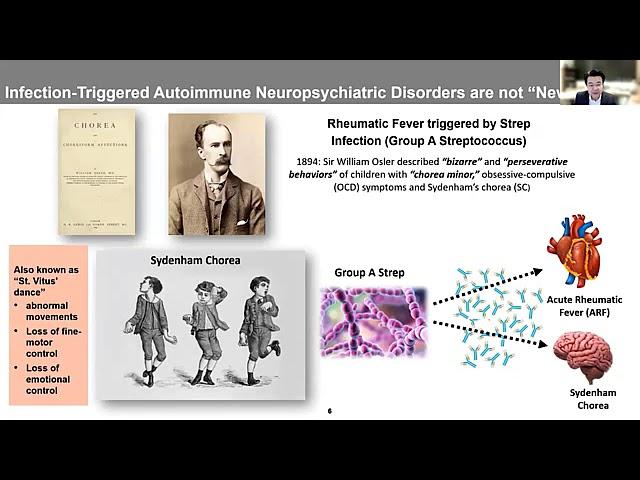
WEBINAR: Utilization of the Cunningham Panel in Clinical Practice
Dr. Craig Shimasaki, President and CEO, Moleculera Labs, reviews the science behind immune-mediated neuropsychiatric disorders and how testing with the Cunningham Panel for antineuronal antibodies can assist in diagnosis and in directing treatment.
Chapters:
2:32 – Start of presentation
4:30 – Neuropsychiatric disorders diagnosed by symptoms, not etiology
6:15 – Can infections cause neuropsychiatric disorders?
7:59 – Rheumatic fever triggered by strep infection
9:42 – Neuronal autoantibodies
9:50 – How does this occur biologically?
13:16 – Study: Brain inflammation on MRI in children with OCD/tics associated with strep infection
15:49 – Other immune-mediated disorders
17:10 – Infections frequently associated with autoimmune encephalopathies
17:29 – Antibodies recognize ‘epitopes’ on infectious agents
20:19 – Molecular mimicry and strep
25:25 – Review of Cunningham Panel assays
27:31 – Case studies of patients tested with the Cunningham Panel
33:21 – Commonalities in patients with antineuronal antibodies
35:10 – Study: Evaluation of the Cunningham Panel
37:41 – Ordering & testing process - Cunningham Panel
38:24 – Treatment Guidelines for PANS/PANDAS
46:16 – Q&A
46:24 - After initiating treatment for infection, when do you expect antibodies to go down and when should you retest?
48:34 – What is an alternative for IVIG because we don’t know if it’s been effected by vaccinated blood supply.
51:49 – Can you speak to the testing before and after on the group that did not respond to treatment? (In reference to a 58 patient case study)
54:24 – Are PET scans often done on these patients and what do they typically show?
Chapters:
2:32 – Start of presentation
4:30 – Neuropsychiatric disorders diagnosed by symptoms, not etiology
6:15 – Can infections cause neuropsychiatric disorders?
7:59 – Rheumatic fever triggered by strep infection
9:42 – Neuronal autoantibodies
9:50 – How does this occur biologically?
13:16 – Study: Brain inflammation on MRI in children with OCD/tics associated with strep infection
15:49 – Other immune-mediated disorders
17:10 – Infections frequently associated with autoimmune encephalopathies
17:29 – Antibodies recognize ‘epitopes’ on infectious agents
20:19 – Molecular mimicry and strep
25:25 – Review of Cunningham Panel assays
27:31 – Case studies of patients tested with the Cunningham Panel
33:21 – Commonalities in patients with antineuronal antibodies
35:10 – Study: Evaluation of the Cunningham Panel
37:41 – Ordering & testing process - Cunningham Panel
38:24 – Treatment Guidelines for PANS/PANDAS
46:16 – Q&A
46:24 - After initiating treatment for infection, when do you expect antibodies to go down and when should you retest?
48:34 – What is an alternative for IVIG because we don’t know if it’s been effected by vaccinated blood supply.
51:49 – Can you speak to the testing before and after on the group that did not respond to treatment? (In reference to a 58 patient case study)
54:24 – Are PET scans often done on these patients and what do they typically show?
Комментарии:
WEBINAR: Utilization of the Cunningham Panel in Clinical Practice
Moleculera Biosciences
Asul semua penduduk tanah cahaya/ultraman
pitchyfries
The Most Embarrassing Goalkeeping Mistake
Tom Harris Football
Dino Muhic berättar om drömmålet
Jens Bollius
How to Show Hidden Files and Folders on macOS
Unpacked Technologies
Video review: Headlight restoration instruction video
SaveGreenHere


























